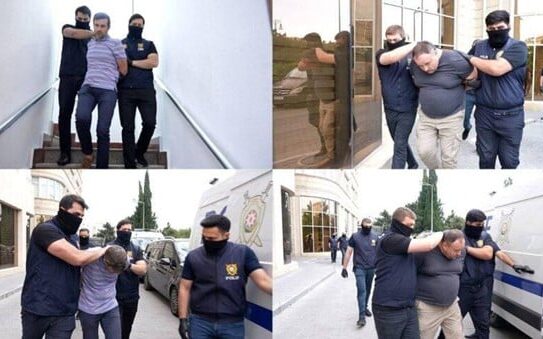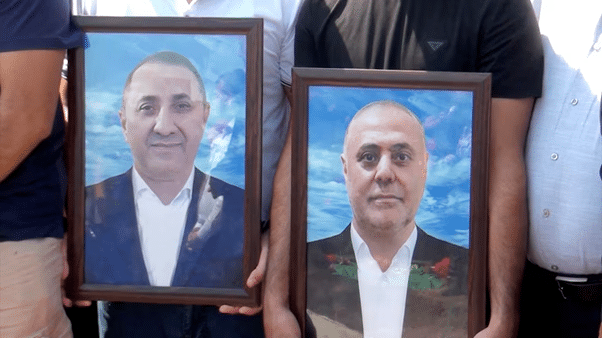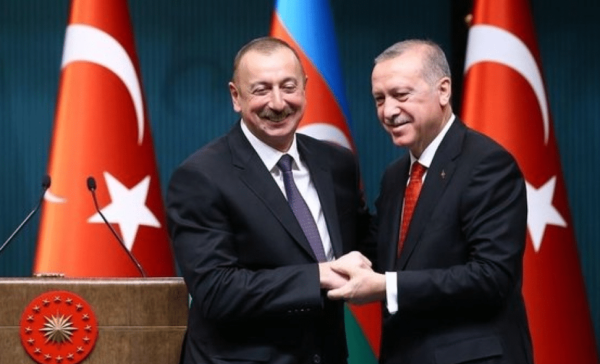Russian security forces detain Azerbaijani nationals in a raid in Yekaterinburg, Russia, June 27, 2025
Energy, Diplomacy, and Human Rights: Europe’s Azerbaijan Gamble
Tensions between Azerbaijan and Russia have escalated sharply after the deaths of Azerbaijani citizens during a Russian police raid in the city of Yekaterinburg.
In the raid on June 27, ostensibly as part of a long-running murder investigation, Russian authorities detained around 50 people of Azerbaijani origin. Two suspects, brothers Huseyn and Ziyaddin Safarov died in custody amid reports of severe beatings. Several other Azerbaijanis were hospitalized with serious injuries.
The Foreign Ministry in Baku summoned Russia’s envoy and delivered a formal note of protest, condemning the raid as “brutal and unjustified” and “in serious violation of legal norms”. Officials accused Russian security forces of targeting Azerbaijanis on ethnic grounds and demanded a thorough investigation to hold those responsible to account.
In retaliation, an Azerbaijani “special operation” at the Baku office of the Kremlin’s outlet Sputnik Azerbaijan detained several Russian employees. Executive Director Igor Kartavykh and Chief Editor Yevgeny Belousov have been accused of espionage as operatives of the Russian State security service FSB.
The unfolding tit-for-tat detentions and the closures of almost all Russian news outlets in Azerbaijan has strained a pragmatic relationship. It could signal a wider realignment of power and relationships in the South Caucasus.
A New Trade Corridor?
The tension has been fuelled by speculation that an agreement is imminent on the Zangezur corridor, which would connect Azerbaijan with its Nakhchivan enclave via Armenian territory. Turkish and Azerbaijani analysts have asserted that the arrangement was confirmed during Armenian Prime Minister Nikol Pashinyan’s visit to Turkish President Recep Tayyip Erdoğan on June 20.
Resolution of the long-disputed corridor would establish an alternative to northern trade routes. These have faced substantial disruptions due to geopolitical tensions, particularly Russia’s invasion of Ukraine.
There may be further developments, possibly for reconciliation, possibly for division. Azerbaijani President Ilham Aliyev is set to meet Pashinyan next week in Dubai. Heads of states, including Pakistan Prime Minister Shehbaz Sharif, arrived in Azerbaijan on Friday for the 17th Summit of the Economic Cooperation Organisation.
The ECO was established in 1985 by Iran, Pakistan, and Turkey as the successor to the Regional Cooperation for Development Organization (RCD), which had existed since 1964. After the collapse of the USSR, post-Soviet states like Azerbaijan, Kazakhstan, Uzbekistan, Turkmenistan, Kyrgyzstan, and Tajikistan joined, as well as Afghanistan.
Despite its founding role in the ECO, Iran issued a warning through its Ambassador to Armenia over the Zanzegur Corridor. Mehdi Sobhani declared that the route will harm both Armenian and Iranian interests: “For us, this is a red line.”
The Fallout from the Russian Raid
Meanwhile, the deaths of the Safarov brothers in the Yekaterinburg raid has become a rallying point for public outrage in Azerbaijan.
As the bodies were repatriated to Baku for autopsy, as local media and officials alleged that the men died from blunt force trauma rather than any legal measures. To manage the fallout, the head of Russia’s Investigative Committee in Moscow took
charge of the case.
Azerbaijani brothers Huseyn and Ziyaddin Safarov, who allegedly died in Russian custody after the raid in Yekaterinburg on June 27, 2025 (Reuters)
The European Union’s Ambassador in Baku weighed in, calling the reported torture and fatalities “inhuman treatment” and voicing concern for the victims’ families.
Azerbaijani acted quickly. The Culture Ministry announced it was cancelling all Russian- linked cultural events, from concerts and exhibitions to festivals. The Parliament withdrew from a bilateral cooperation meeting scheduled in Moscow, as lawmakers demanded justice for the victims.
In a further snub, Baku cancelled a visit by Russian Deputy Prime Minister Alexei Overchuk, bluntly stating that under current circumstances it saw “no point” in hosting any Russian official. President Volodymyr Zelensky of Ukraine, withstanding Moscow’s invasion, called President Aliyev, to convey the condolences
of the Ukrainian public.
The Interior Ministry sent a pointed message. Mirroring the Yekaterinburg raids, it announced the detention of two gangs
composed of Russian citizens in Baku.
The Russians tried to push back. The Foreign Ministry summoned Azerbaijan’s Ambassador in Moscow to complain about “unfriendly actions”, denouncing a violation of “journalists’ rights”. Kremlin spokesman Dmitry Peskov argued that a domestic law enforcement operation in Russia “should not lead to diplomatic démarches and spats” between partners.
But Baku held firm. Officials said Sputnik’s registration to operate in Azerbaijan had been revoked in February after authorities warned that the outlet did not have proper legal status. Despite the revocation, Sputnik used “illegal financing” to continue publication.
Resentment of Russia, Alignment with Turkey
For years, Azerbaijani public opinion and much of its political elite have harbored resentment over undue Russian influence. Memories linger of Soviet-era repression and of Moscow’s support for Armenia during earlier phases of the Nagorno-Karabakh conflict.
Heading towards an election in September, President Aliyev has increasingly pushed back against Kremlin influence operations, shutting down Russian-language schools and limiting the activity of Russian peacekeepers on Azerbaijani territory.
Critical to Azerbaijan’s strategic calculus is its ever-closer alliance with Turkey, a relationship encapsulated by the motto “One nation, two states”. Ankara has become Baku’s principal partner for security and economic stability, especially after Turkey’s decisive support for Azerbaijan’s military victory over Armenia in the 2020 Karabakh war.
The current diplomatic spat may accelerate a faster Azerbaijan pivot toward Turkey and other regional blocs at Russia’s expense. The domestic mood in Azerbaijan appears to favor this reorientation, and the nationalist sentiment and pride in recent military successes have bolstered calls for a foreign policy free from the shadow of the Kremlin.
The Armenia Dimension
Armenia, despite being a long-time treaty ally of Russia, is also on a trajectory that lessens Moscow’s leverage. Prime Minister Nikol Pashinyan, frustrated by what he saw as lackluster Russian support during the 2020 war with Azerbaijan and its aftermath, has made unprecedented overtures to the West – from hosting EU civilian monitors on Armenia’s borders to conducting military exercises with NATO countries.
In recent months, Yerevan’s relations with the Kremlin have frayed openly. Armenian officials have criticized Russia’s inability or unwillingness to guarantee Armenia’s security, and mass protests in Yerevan have targeted the perceived failures of the Russian-led Collective Security Treaty Organization.
In the last week of June, Armenian authorities arrested several prominent figures, including a well-known cleric, on allegations of plotting a coup. The move was widely seen as pre-empting a Russia-backed attempt to destabilize Pashinyan’s government.
While Armenia remains economically and militarily intertwined with Russia, trust and alignment are at an all-time low, pushing Yerevan to diversify its partnerships out of necessity. That includes Pashinyan’s visit to Turkish President Erdoğan on June 20.
Kremlin Receding?
With Russia distracted and weakened by conflicts elsewhere, not least its invasion of Ukraine, and now estranged by Baku’s actions, Turkey’s influence is filling the vacuum. An evolving Ankara-Baku axis, potentially bringing in Armenia, capitalizes on shared ethnic and cultural ties.
For Russia, the prospect of losing its grip on both Azerbaijan and Armenia is a strategic nightmare. It threatens to diminish Moscow’s role as the primary arbiter in Caucasus disputes, a role it has held for three decades.
The Kremlin may attempt to compensate by seeking leverage. But that is problematic: a strengthening of ties with Iran has been shaken by Israel’s 12-day war and the American attack on Iranian nuclear facilities.
Russia’s aura of indispensability in the region seems to be fading. From calculation or desperation, its officials have not only detained Azerbaijanis but tried and failed to topple Armenia’s government. Hoping to project strength, the Kremlin may have exposed its diminishing power in the South Caucasus.



